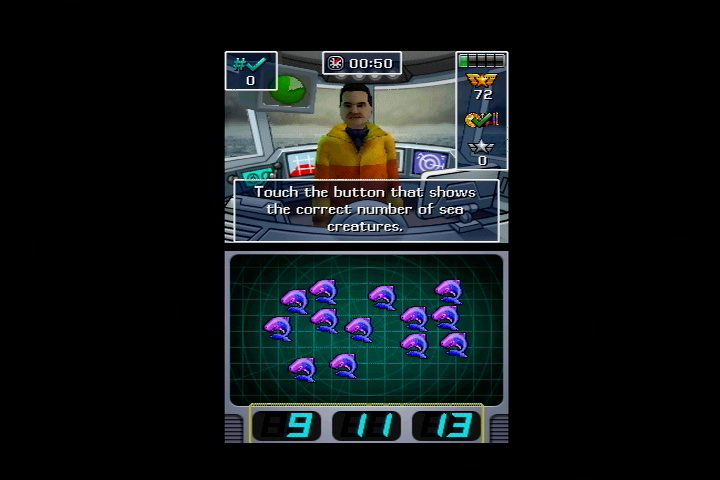The Nintendo DS doesn't need any more below-average collections of brain-training minigames. By extension, that means the Nintendo DS doesn't need Brain Voyage. It's yet another substandard compilation of logic puzzles that fails to do anything new or interesting.
Like with Brain Age, Brain Voyage's puzzles were created by an "expert," in this case mathematician Dr. Reiner Knizia. Unlike Brain Age's doctor, who claims to be able to improve your cognitive abilities, Dr. Knizia seems to be in the game only to take credit for designing the puzzles. This is a stretch because many of the games are clones of existing games such as Memory or Minesweeper, and some of them, such as sliding tiles to unscramble a picture, have been around for hundreds of years. Perhaps he invented a time machine we didn't know about...

Brain Voyage's 16 puzzles are spread among cities across the globe. When you complete a puzzle, you earn a medal as well as coins. The better your performance on a puzzle, the better your reward. Coins are used to unlock new cities as well as puzzle variations. Each puzzle has five variations, for a total of 80 puzzles. This may seem like a good number, but not all of the games are equally enjoyable. One of the best games is a poker/solitaire hybrid in which you're dealt cards and then must try to place them in a grid to make the best hands. Another good one is Carnival, in which you must divvy up dancers onto parade floats according to their number. The Minesweeper clone, Ice Cap, is also enjoyable--especially when it introduces hexagons on the playfield.
The rest of the games are either uninteresting, frustrating, or both. There's a maze challenge that's made more difficult because of inconsistent touch-screen controls; a game where all you do is count sea life; and a real snoozer in which you must memorize the order in which musicians play. A few of the puzzles, such as the one where you must zero out equations by addition, subtraction, multiplication, and division, are significantly more challenging than the others, and there are no hints to help when you're in a bind. The game is also quite demanding with its medal requirements, which is a problem when you've done your best and still can't get a medal. The lack of hints is a problem because if you're unable to earn medals you can't unlock any new areas. Every once in a while the good doctor will have pity on you and give you a few perseverance coins, but these aren't much help later in the game when the cities and puzzles are expensive.
You can save your favorite puzzles to play later, or you can play random ones that you've already unlocked, but there's not much point in finishing Brain Voyage's puzzles, and there isn't any reason to revisit already completed ones. The game doesn't track your progress, it doesn't evaluate your abilities, and it doesn't do anything to encourage you to play on a regular basis. However, you can share any of the puzzles you've unlocked with friends. This is great for them because they can play the game's few good brainteasers without having to buy it, but there's no head-to-head play, so your reward for sharing is to stand there and watch them.

Brain Voyage's presentation doesn't do anything to keep you coming back for more. The ever-present 3D model of Dr. Knizia looks kind of creepy with its oversized head. The puzzles themselves aren't much to look at; some are adequate, whereas others are extremely ugly. The audio is irritating and will have you reaching for the volume switch in a matter of minutes.
It's possible to squeeze a few hours of entertainment from Brain Voyage, but you'll see everything it has to offer in that short time. The presentation is dull and there's no reason to revisit puzzles once you've finished them. It's impossible to recommend purchasing this "me too" game.